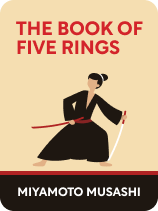

This article is an excerpt from the Shortform book guide to "The Book of Five Rings" by Miyamoto Musashi. Shortform has the world's best summaries and analyses of books you should be reading.
Like this article? Sign up for a free trial here .
What are the top three rules for samurai sword fighting? How can these lessons be applied in a modern context?
In the historical work The Book of Five Rings, legendary samurai Miyamoto Musashi shares his top three rules for Japanese sword fighting: 1) know your environment, 2) think like your competitor, and 3) adapt your strategy to the circumstances. While these rules seem very specific to combat, they can be adapted and applied to modern life.
Keep reading for Musashi’s rules of Japanese sword fighting and how they are relevant today.
Japanese Samurai Sword Fighting
Musashi warns that many people make the mistake of becoming set and narrow-minded in their ways. When faced with real-life challenges, they jeopardize their chances of success by failing to optimize the strategies they have developed. No matter how knowledgeable or experienced a warrior may be, he must always keep the following rules in mind to win in samurai sword-fighting combat.
Rule #1: Know Your Environment
Musashi says that awareness is the defining factor in maintaining control of a difficult situation. Take note of everything in your environment that could help or hinder you, and adjust your plans accordingly to maximize your advantages. This requires keeping in mind the difference between perception and sight as discussed in The Water Book: It is not enough just to passively see things; you must constantly perceive things and weigh what you are observing when planning your methods of attack. For a warrior, this means actively taking note of any relevant aspects of the battleground’s terrain, the positioning of the enemy, and other conditions of climate and logistics that could affect the combat.
Rule #2: Think Like Your Competitor
Musashi observes that it’s not enough to know your own goals and strategies inside and out: The mark of a true champion is the ability to think about things from the competitor’s point of view. Learning to think like the enemy enables you to anticipate potential tactics the enemy might use, while also making it easier to evaluate your own position more objectively. Musashi describes this ability to see things from the enemy’s point of view as a form of infiltration, both literally and figuratively. On a figurative level, you infiltrate by getting a sense of what the enemy is going to do and why, and what his strengths and weaknesses are. On a literal level—in terms of real-world combat—you can sometimes disorient and rout the enemy by blending in and taking him by surprise.
Rule #3: Adapt Your Strategy to the Circumstances
Musashi has nothing but disdain for “one-trick ponies.” In practical terms, this means that if you discover one tactic isn’t working during combat, you must immediately switch to a different strategy. Using the same tactic again after it has already failed to achieve the desired results is a waste of time and energy, and jeopardizes final victory.
Applying These Rules to the Modern Day
In urging readers to know their environment, think like their competitor, and adapt their strategy to the circumstances, Musashi demonstrates that adaptability is, fundamentally, a certain type of mindset that is applicable to all three areas. Some experts claim there are certain qualities that determine how adaptable a person will be. Further, adaptability has become increasingly important in today’s changing economy, especially with the rise of remote work. By cultivating the right mindset, anyone can learn to be more adaptable through putting these behaviors into practice:
Be flexible. Voluntarily change up your routines and habits from time to time instead of falling into the same old patterns. Remain open to networking, taking on new tasks, and changing the way you apply your skills.
Stay curious. Seek to know more about your chosen profession or a subject that interests you. Read a book or article, take a course, or practice a new hobby or skill.
Focus on opportunities. Even challenges or failures hold the possibility for new opportunities within them. When faced with an obstacle or failure, ask yourself what you have learned from your past experiences, what you could have done differently, and how you could use your new knowledge to benefit yourself in the future.
Work well with others. Learn how to accept constructive criticism with grace, and be tactful when offering it to others. Always be willing to compromise if the situation demands it.
Be proactive. Take charge of your life and career by being active instead of passive. Network, upgrade your skills, nurture your personal connections with others, and remain alert to opportunities.
Hone your emotional intelligence. Practice empathy toward others, and seek to understand instead of judge. Respect differences of opinion and/or strategy whenever possible. Travis Bradberry and Jean Greaves point out in Emotional Intelligence 2.0 that it can literally pay off: People with high emotional intelligence make an average of $29,000 more a year than people with low emotional intelligence.
Stay positive. Positive people tend to be more resilient than negative people. Cultivating gratitude, making the most of things, and focusing on the big picture can help keep you grounded and optimistic.

———End of Preview———
Like what you just read? Read the rest of the world's best book summary and analysis of Miyamoto Musashi's "The Book of Five Rings" at Shortform .
Here's what you'll find in our full The Book of Five Rings summary :
- Insights from the famous Samurai Miyamoto Musashi about the Way of the Warrior
- How to apply Musashi’s teachings to your personal and professional lives
- Why success is not based on brute strength or innate talent






